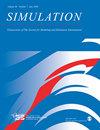Combination of anti-PD-L1 and radiotherapy in hepatocellular carcinoma: a mathematical model with uncertain parameters
IF 2
4区 工程技术
Q4 COMPUTER SCIENCE, INTERDISCIPLINARY APPLICATIONS
Simulation-Transactions of the Society for Modeling and Simulation International
Pub Date : 2022-11-19
DOI:10.1177/00375497221133846
引用次数: 0
Abstract
Blockade of programmed death-ligand-1 (PD-L1) as a new method of immunotherapy for cancers has shown limited efficacy in hepatocellular carcinoma (HCC). The combination of anti-PD-L1 and radiotherapy (RT) enhances the antitumor effect in HCC cancer. The efficacy and interactions of these treatments can be addressed by a mathematical model. We developed a mathematical model using a set of ordinary differential equations (ODEs). The variables include cancer cells, cytotoxic T lymphocytes (CTLs), programmed cell death-1 (PD-1), PD-L1, anti-PD-L1, and ionizing radiation. The model is parameterized with imprecise data set of murine HCC model and the effect of parametric uncertainty is assessed by the fuzzy theorem. The global sensitivity analysis (GSA) is performed to assess model robustness against perturbation in parameters and to identify the most influential parameters on the dynamics of cells and proteins. In silico predictions are consistent with experimental data. The model simulation shows that anti-PD-L1 and RT have a synergistic effect. In silico assessment of treatments’ efficacy in the fuzzy setting of parameters revealed that anti-PD-L1 therapy, RT, and combination treatment caused the uncertainty band of tumor cells to lead to lower populations. This model as a validated rigorous simulation framework can be used to deepen our understanding of tumor and immune cell interactions and helps clinicians to investigate the efficacy of different time schedules of anti-PD-L1, RT, and combination therapy. The fuzzy theorem in conjunction with the classical ODE model that is parameterized by imprecise data was used to predict reliable outcomes of treatment.抗pd - l1联合放疗治疗肝癌:一个参数不确定的数学模型
阻断程序性死亡配体-1 (PD-L1)作为一种新的癌症免疫治疗方法,在肝细胞癌(HCC)中显示出有限的疗效。抗pd - l1联合放疗(RT)可增强肝癌的抗肿瘤作用。这些治疗的疗效和相互作用可以通过一个数学模型来解决。我们利用一组常微分方程(ode)建立了一个数学模型。变量包括癌细胞、细胞毒性T淋巴细胞(ctl)、程序性细胞死亡-1 (PD-1)、PD-L1、抗PD-L1和电离辐射。采用不精确的小鼠肝细胞癌模型数据集对模型进行参数化,并利用模糊定理对参数不确定性的影响进行评价。进行全局敏感性分析(GSA)以评估模型对参数扰动的鲁棒性,并确定对细胞和蛋白质动力学影响最大的参数。计算机预测与实验数据是一致的。模型仿真表明,抗pd - l1和RT具有协同效应。在参数模糊设置下对治疗效果的计算机评价显示,抗pd - l1治疗、RT和联合治疗导致肿瘤细胞的不确定性带降低。该模型作为一个经过验证的严格的模拟框架,可以用来加深我们对肿瘤和免疫细胞相互作用的理解,并帮助临床医生研究抗pd - l1、RT和联合治疗的不同时间计划的疗效。将模糊定理与经典的ODE模型相结合,用不精确的数据参数化来预测可靠的治疗结果。
本文章由计算机程序翻译,如有差异,请以英文原文为准。
求助全文
约1分钟内获得全文
求助全文
来源期刊
CiteScore
3.50
自引率
31.20%
发文量
60
审稿时长
3 months
期刊介绍:
SIMULATION is a peer-reviewed journal, which covers subjects including the modelling and simulation of: computer networking and communications, high performance computers, real-time systems, mobile and intelligent agents, simulation software, and language design, system engineering and design, aerospace, traffic systems, microelectronics, robotics, mechatronics, and air traffic and chemistry, physics, biology, medicine, biomedicine, sociology, and cognition.

 求助内容:
求助内容: 应助结果提醒方式:
应助结果提醒方式:


